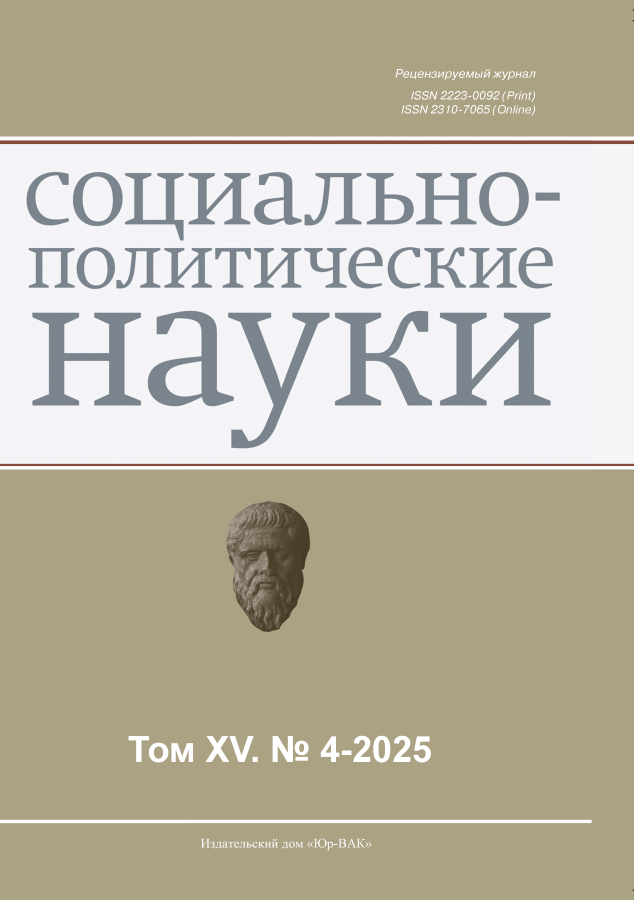Documentary film ecosystem management and a new methodological post-platform model using the example of the film “Master of the Game”
- Авторлар: Garaganov A.V.1
-
Мекемелер:
- Financial University under the Government of the Russian Federation
- Шығарылым: Том 15, № 4 (2025)
- Беттер: 254-262
- Бөлім: Sociology of management
- URL: https://journal-vniispk.ru/2223-0092/article/view/348454
- DOI: https://doi.org/10.33693/2223-0092-2025-15-4-254-262
- EDN: https://elibrary.ru/YWMDAZ
- ID: 348454
Дәйексөз келтіру
Аннотация
The article describes a post-platform model of managing a documentary film ecosystem using the example of the Master of the Game project, interpreting the film itself as an active node of circulation of cultural and transgenerational memory. The theoretical framework combines the ideas of ecosystem management, the field of cultural production, social and communicative memory, historical locations, as well as practical narrative engineering and the logic of hybrid media distribution. The methodological sequence of stages is described: semantic mapping and ordering of sources, the use of narrative techniques of mirror comparison and rhyming of motifs, ethical filtering with recording of decisions and transparency of the use of artificial intelligence tools, formative assessment through an agreed system of metrics at the level of the scene, work and the wider cultural environment, and then re-enrichment of the archival array based on the audience’s reaction. The use of generative AI is limited by cognitive support and is accompanied by directorial control, increasing the accuracy of semantic and visual narration. The director’s competency model includes and is consistent with current trends in digital transformation, digitization of heritage, impact measurement and personalized cognitive media consumption.
Толық мәтін
##article.viewOnOriginalSite##Авторлар туралы
Artur Garaganov
Financial University under the Government of the Russian Federation
Хат алмасуға жауапты Автор.
Email: arturcompany21@gmail.com
researcher, Center “Locomotives of Growth”, Department of Sociology
Ресей, MoscowӘдебиет тізімі
- Busalov M.A. Film production: in search of perfection. In: Experience and problems of reforming the management system at a modern enterprise: tactics and strategy. Collection of articles of the XXIII International scientific and practical conference (Penza, March 22–23, 2024). Penza: Penza State Agrarian University, 2024. Pp. 95–98. (In Rus.). EDN: DLLWLA.
- Vershinina I.A., Martynenko T.S. Smith J. The Internet is not what you think: History, philosophy, warning. Questions of Philosophy. 2025. No. 1. Pp. 209–212. (In Rus.). doi: 10.21146/0042-8744-2025-1-209-212. EDN: IQKDCY.
- Garaganov A.V. Documentary film “The Tale of One Pattern” as an educational model for teachers, directors and university students. Bulletin of GSU. 2025. No. 2. Pp. 342–350. (In Rus.). EDN: CZMBDX.
- Garaganov A.V. How films about artificial intelligence influence the attitude of residents of megacities to smart city technologies. Sociopolitical Sciences. 2024. Vol. 14. No. 6. Pp. 203–209. (In Rus.). doi: 10.33693/2223-0092-2024-14-6-203-209. EDN: EZKPLC.
- Garaganov A.V. Innovative approach to social management of film production: The method of “role installation”. Sociopolitical Sciences. 2024. Vol. 14. No. 5. Pp. 173–178. (In Rus.). doi: 10.33693/2223-0092-2024-14-5-173-178. EDN: SJJOIO.
- Garaganov A.V. Cinema as a mirror of urbanization: Socio-psychological analysis of the representation of smart cities in modern cinema. Problems of Economics and Legal Practice. 2024. Vol. 20. No. 5. Pp. 284–290. (In Rus.). doi: 10.33693/2541-8025-2024-20-5-284-290. EDN: WARVDK.
- Demidova M.V. Individual and social values in the philosophical teachings of S. Frank, E. Cassirer, P. Bourdieu. Paradigm: Philosophical and Cultural Almanac. 2017. No. 27. Pp. 206–216. (In Rus.). EDN: ZQQHWD.
- Dilmukhamedov E.V. Representation of New York in the works of American pioneers of documentary film. In: Step into Historical Science. Proceedings of the XX All-Russian Scientific and Practical Conference of Young Scientists (Yekaterinburg, May 22, 2020). Ekaterinburg, 2020. Pp. 25–28. EDN: BTXPFT.
- Zvonareva M.S. Documentary film as a historical source: Features of analysis and interpretation. Locus: People, Society, Cultures, Meanings. 2019. No. 3. Pp. 98–107. (In Rus.). EDN: GMAQVS.
- Kovtun E.N. Poetics of the extraordinary: Artistic worlds of fantasy, fairy tale, utopia, parable and myth (based on European Literature of the first half of the 20th century). Moscow: Moscow State University, 1999. 308 p. ISBN: 5-211-02571-7. EDN: QROBSN.
- Kolotaev V.A. Initiation. Narrative. Identity. On the relationship between the compositional nodes of the narrative and initiation rites. Burganov House. Cultural Space. 2024. Vol. 20. No. 5. Pp. 26–39. (In Rus.). doi: 10.36340/2071-6818-2024-20-5-26-39. EDN: SOEREV.
- Listov V.S. Non-fiction cinema: Document or mystification? Historical Journal: Scientific Research. 2011. No. 5. Pp. 16–22. (In Rus.). EDN: PVNXGV.
- Myasnikova M.A., Trukhina A.V. The problem of the existence of documentary film in the digital age. In: Audiovisual platform of contemporary culture. Proceedings of the International Scientific Conference (within the Framework of the XV Kolosnitsyn Readings) (Yekaterinburg, November 20–21, 2020). Yekaterinburg: Ural State Pedagogical University, 2020. Pp. 92–97. EDN: CGNTAJ.
- Sakharova I.N., Tyutryumov A.A. Definition of features of theoretical provisions and principles of documentary film production. International Journal of Humanities and Natural Sciences. 2019. No. 3-1. Pp. 10–14. (In Rus.). doi: 10.24411/2500–1000–2019–10604. EDN: XVRKKX.
- Solovieva M.V. New principles of formation of educational programs for art specialties. In: Sphere of knowledge: Issues of science in interpretation of modern educational process. Collection of scientific papers. Kazan: SitIvent, 2018. Pp. 26–30. EDN: YRCLJZ.
- Stepanyan A.V. Features of auteur and television documentary films. Philological Sciences. Issues of Theory and Practice. 2018. No. 2-1 (80). Pp. 44–46. (In Rus.). EDN: YODNDU.
- Tikhonov A.V. From sociology of management to sociology of management. Sociological Research. 2011. No. 2 (322). Pp. 40–45. (In Rus.). EDN: NRATRN.
- Yakimov A.E. Dziga Vertov’s cinematography as a language of temporal reflection. Discourse. 2021. Vol. 7. No. 3. Pp. 36–51. (In Rus.). doi: 10.32603/2412-8562-2021-7-3-36-51. EDN: YQMGIM.
Қосымша файлдар








